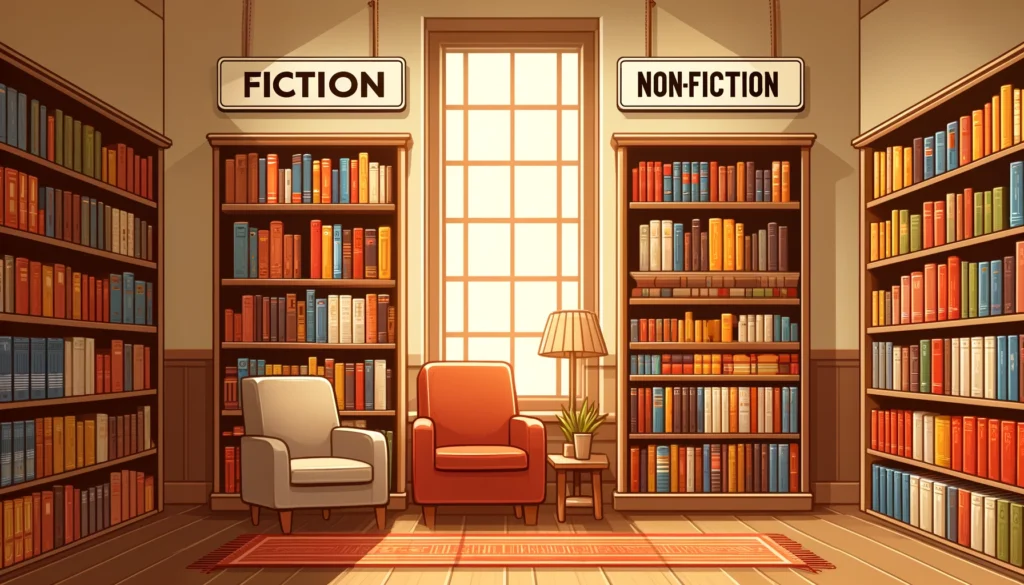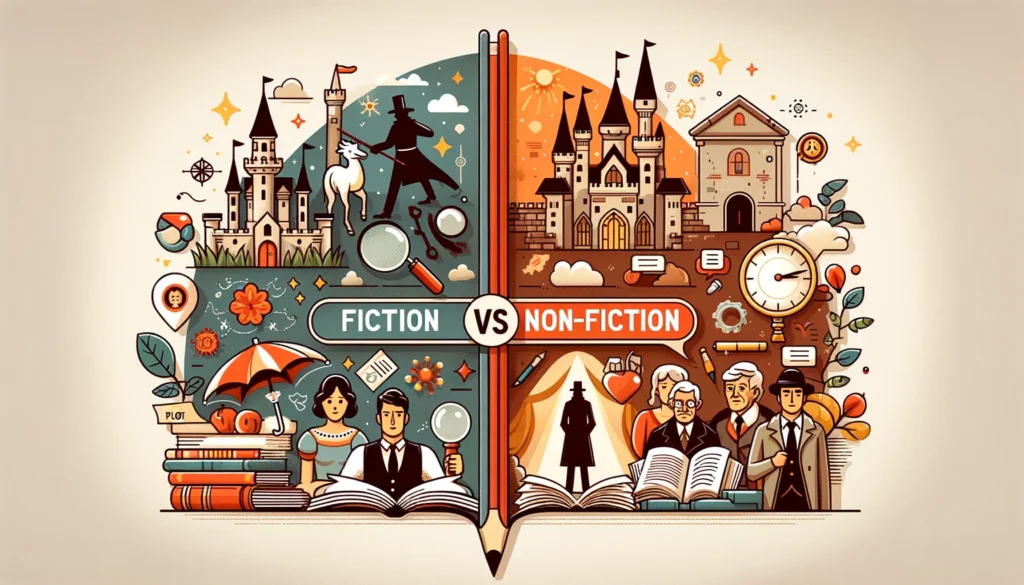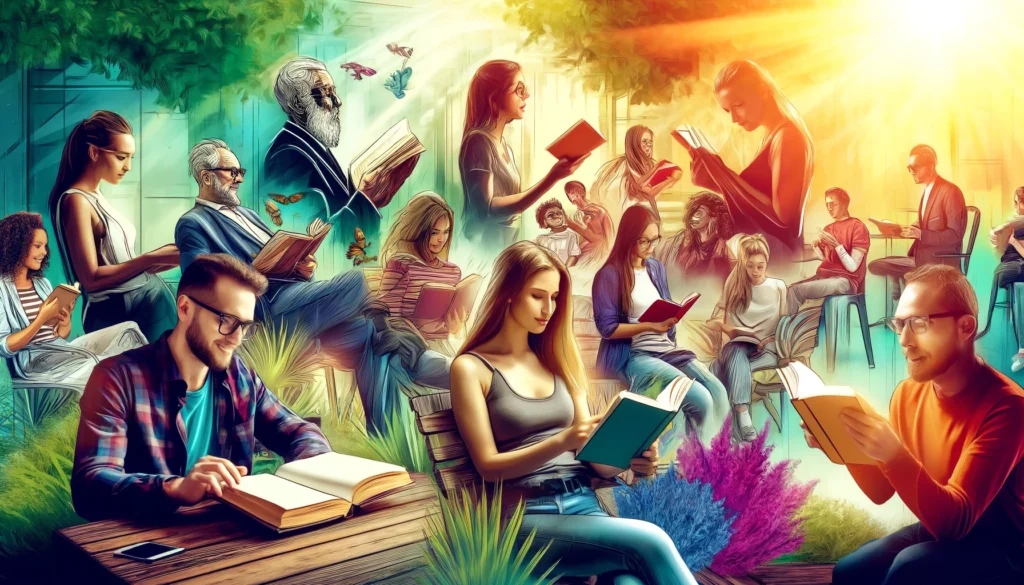Ever found yourself lost in the magical world of Hogwarts, battling dragons, or solving a gripping mystery? Or perhaps you’ve been deeply moved by a true story, learned something new from a biography, or felt inspired by a self-help book? Both fiction and non-fiction have unique ways of capturing our imaginations and enriching our lives. But what exactly sets these two genres apart? Let’s dive into the world of fiction and non-fiction and explore their distinct characteristics, purposes, and the joy they bring to readers of all ages.
Defining Fiction and Non-Fiction

Before we delve into the details, let’s start with the basics.
Fiction is a genre of literature that involves imaginary events and characters. It’s a world where dragons can fly, detectives can solve any mystery, and romance can bloom in the most unexpected places.
Non-Fiction, on the other hand, is based on real events, people, and facts. It’s all about reality—be it a historical account, a memoir, or a guide on how to improve your life.
Examples:
- Fiction: Think of J.K. Rowling’s Harry Potter series, Suzanne Collins’ The Hunger Games, or George Orwell’s 1984.
- Non-Fiction: Consider Becoming by Michelle Obama, Sapiens by Yuval Noah Harari, or The Diary of a Young Girl by Anne Frank.
Characteristics of Fiction
Fiction is all about creativity and imagination. Here are some key elements:
Elements of Fiction
- Plot: The sequence of events that make up the story. From the protagonist’s journey to the climax and resolution, the plot keeps readers hooked.
- Characters: The individuals who populate the story. Well-developed characters can make or break a story.
- Setting: The time and place where the story unfolds. It could be a magical kingdom, a futuristic city, or a quaint village.
- Theme: The underlying message or central idea of the story. It could be love, bravery, or the battle between good and evil.
- Narrative Style: The voice and point of view from which the story is told. It could be first-person, third-person, or even omniscient.
Types of Fiction
Fiction comes in many flavors:
- Fantasy: Magical realms and supernatural elements.
- Science Fiction: Futuristic technology and speculative science.
- Mystery: Whodunits and crime-solving adventures.
- Romance: Love stories with emotional highs and lows.
- Historical Fiction: Stories set in the past, often featuring real events or figures.
Purpose and Appeal
Fiction is often read for:
- Escapism: To get lost in another world and forget about reality for a while.
- Creativity: To enjoy the boundless creativity of the author’s imagination.
- Emotional Connection: To feel empathy and connect with characters’ experiences.
Personal Anecdote: I remember reading The Hobbit by J.R.R. Tolkien during a particularly stressful time in school. The adventures of Bilbo Baggins transported me to Middle-earth, offering a much-needed escape and reigniting my love for reading.
Characteristics of Non-Fiction
Non-fiction is grounded in reality and focuses on providing factual information. Here are its key elements:
Elements of Non-Fiction
- Factual Accuracy: Everything presented is based on verified facts.
- Research: Thorough investigation and evidence to support the content.
- Analysis: Deep insights and explanations of events, behaviors, and concepts.
- Presentation: Clear and structured presentation of information.
Types of Non-Fiction
Non-fiction is a broad category that includes:
- Biography: The life story of a person, written by someone else.
- Memoir: A personal account of specific events in someone’s life, written by that person.
- Self-Help: Books offering advice and strategies for personal improvement.
- History: Detailed accounts of past events and their impact.
- Journalism: Reporting on current events and issues.
Purpose and Appeal
Non-fiction is often read for:
- Learning: To gain knowledge about the world and various subjects.
- Self-Improvement: To develop skills and better oneself.
- Understanding: To gain insights into different perspectives and experiences.
Personal Anecdote: Reading Becoming by Michelle Obama gave me a profound understanding of her journey and the challenges she faced. It wasn’t just informative but also deeply inspiring.
Comparing Fiction and Non-Fiction

Truth vs. Imagination
Fiction embraces imagination and creativity, often exploring “what if” scenarios and fantastical elements. Non-fiction, however, sticks to the truth, presenting real events and factual information.
Emotional vs. Intellectual Engagement
Fiction tends to engage readers emotionally, drawing them into the characters’ lives and experiences. Non-fiction, while it can also be emotionally impactful, often engages readers on an intellectual level, providing knowledge and insights.
Entertainment vs. Education
Fiction is often consumed for entertainment, providing an escape and a break from reality. Non-fiction, while it can also be entertaining, primarily aims to educate and inform.
The Blurred Lines
Sometimes, the line between fiction and non-fiction isn’t so clear. Here are a few examples:
Creative Non-Fiction
This genre uses literary techniques to tell factual stories. Narrative journalism and personal essays fall into this category. Think of In Cold Blood by Truman Capote, which reads like a novel but is a true crime story.
Historical Fiction
These are fictional stories set in real historical contexts. They often feature real events or figures but add imagined elements to make the story more engaging. The Book Thief by Markus Zusak is a prime example.
Memoirs and Autobiographies
While they are non-fiction, memoirs and autobiographies often read like novels. They focus on personal experiences and emotions, making them compelling and relatable.
Personal Anecdote: I was captivated by Wild by Cheryl Strayed, a memoir that reads like an adventurous novel. Strayed’s journey on the Pacific Crest Trail was both a physical and emotional odyssey, blending the factual with the narrative style of fiction.
Benefits of Reading Both

Developing Empathy and Creativity
Fiction allows readers to step into someone else’s shoes, fostering empathy and enhancing creativity. By imagining different scenarios and characters, readers expand their understanding of human emotions and relationships.
Gaining Knowledge and Perspective
Non-fiction provides factual information and diverse perspectives, helping readers learn about the world and develop informed opinions. It’s a gateway to understanding history, science, culture, and more.
Building a Balanced Reading Habit
A well-rounded reading habit includes both fiction and non-fiction. This balance ensures a blend of entertainment, emotional engagement, intellectual growth, and factual knowledge.
Personal Tip: I like to alternate between fiction and non-fiction. After finishing a thrilling fantasy novel, I might pick up a thought-provoking biography. This keeps my reading experience fresh and varied.
Tips for Choosing Between Fiction and Non-Fiction
Identify Your Purpose
Are you reading to relax and escape reality, or to learn something new? Your purpose can guide your choice between fiction and non-fiction.
Consider Your Interests
Think about what topics or genres excite you. Are you fascinated by history, or do you love a good mystery? Your interests will naturally draw you to either fiction or non-fiction.
Mix It Up
Don’t limit yourself to one genre. Explore different types of books to keep your reading experience diverse and enriching.
Personal Recommendation: If you loved a particular novel, try finding a non-fiction book related to its theme. For example, if you enjoyed 1984 by George Orwell, you might find Sapiens by Yuval Noah Harari an intriguing non-fiction companion.
Conclusion
Fiction and non-fiction each offer unique experiences and benefits. Fiction transports us to imaginative worlds, while non-fiction grounds us in reality and expands our knowledge. By understanding the distinct characteristics and purposes of these genres, we can appreciate the richness they bring to our reading lives.
So, whether you’re diving into a magical adventure or exploring the depths of human history, remember to enjoy the journey. And don’t forget to share your favorite books, both fiction and non-fiction, with friends and fellow readers. Happy reading!
Additional Resources
Recommended Reading Lists
- Fiction: Harry Potter series by J.K. Rowling, The Hunger Games by Suzanne Collins, To Kill a Mockingbird by Harper Lee.
- Non-Fiction: Becoming by Michelle Obama, Sapiens by Yuval Noah Harari, The Immortal Life of Henrietta Lacks by Rebecca Skloot.
Further Reading
- Articles: “The Power of Storytelling in Fiction” and “The Importance of Non-Fiction in Education.”
- Websites: Goodreads for book recommendations, Book Riot for reading tips and lists.
